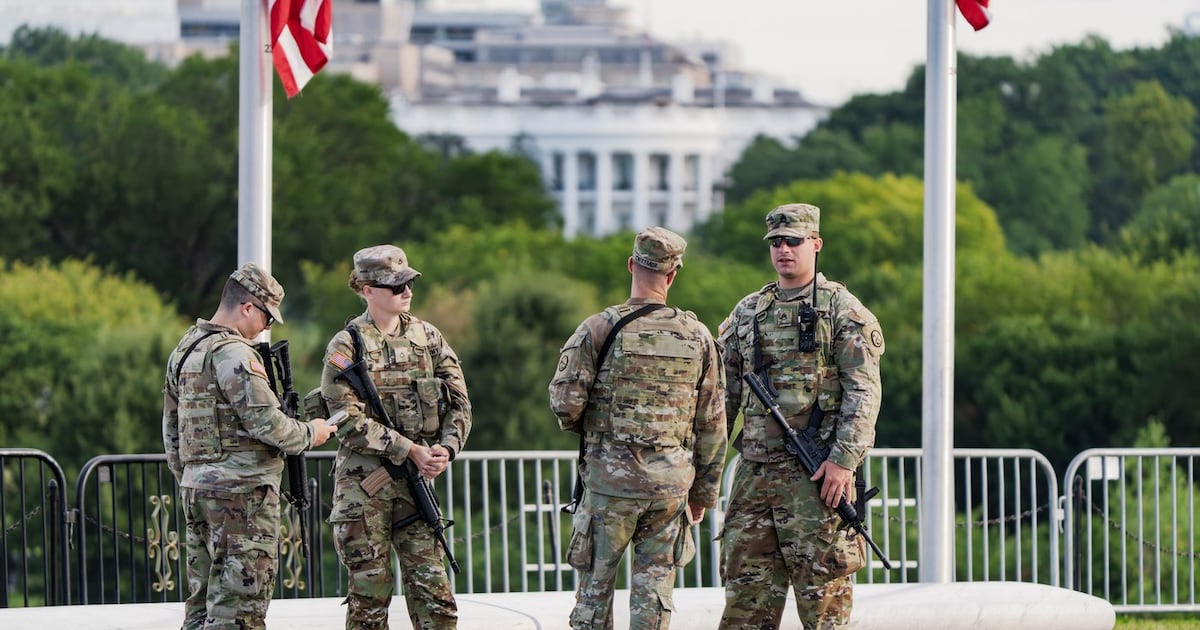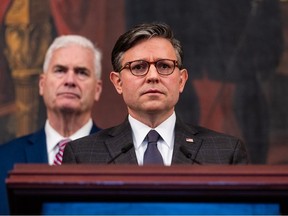Politics
Trump Expands Military Role on U.S. Soil, Republicans Support

U.S. President Donald Trump is increasing the military’s role within domestic borders, prompting significant discussion among lawmakers and experts alike. The National Guard has begun patrolling cities, and plans are in place for military deployment against gangs suspected of drug trafficking. This approach marks a departure from traditional military use, which has typically been limited to extraordinary circumstances, such as natural disasters or civil unrest.
The president’s actions have gained the support of many Congressional Republicans, who view military assistance as essential in combating crime in urban areas. Senator Roger Wicker, chair of the Senate Armed Services Committee, expressed approval for the military presence, suggesting that it would benefit cities facing high crime rates. He stated, “If I were one of those mayors, I’d be glad to have the help.”
In New Orleans, House Speaker Mike Johnson echoed similar sentiments, emphasizing the need for National Guard troops in a city he described as struggling with crime. “New Orleans, like most Democrat-run cities, has a high crime rate, so it would be helpful,” Johnson told the Associated Press. This sentiment is supported by recent polling from the AP-NORC Center for Public Affairs Research, which indicates that 81 percent of Americans view crime as a significant issue in large cities.
While Republicans have often found political traction by focusing on crime, statistics reveal a different narrative. Overall crime rates across the nation have decreased, with some cities experiencing the lowest levels seen in 30 years.
Trump’s Unconventional Use of the National Guard
Historically, the deployment of National Guard troops within the United States has been limited to specific crises. Past instances include the 1894 Pullman strike and the Civil Rights era interventions in the South. Trump’s current strategy, however, appears to diverge from these precedents. Rather than responding to an immediate crisis, he is leveraging military resources to further his administration’s policy objectives.
Experts like Joseph Nunn from the Brennan Center note that this unprecedented integration of the military into civilian law enforcement raises significant concerns. “All of these things indicate an administration that is making a broad, concerted effort to insert the military into civilian law enforcement in a way and on a scale that has no precedent in American history,” Nunn stated.
Trump asserts that he has the constitutional authority to send National Guard troops into cities, even against the wishes of state governors. “I’m the president of the United States. If I think our country is in danger — and it is in danger in these cities — I can do it,” he remarked recently.
Legal and Historical Context
The deployment of the National Guard is governed by laws established by Congress, which define the circumstances under which such actions can take place. Nevertheless, the Republican-controlled Congress has largely refrained from challenging Trump’s approach. Instead, legal scrutiny has fallen on the judiciary, which recently addressed Trump’s actions concerning the Posse Comitatus Act. This nearly 150-year-old law restricts military involvement in domestic law enforcement.
A federal judge ruled that the Trump administration violated this act when it deployed National Guard troops to the Los Angeles area in early June 2020 following protests regarding immigration raids. U.S. District Judge Charles Breyer expressed concern over the implications of creating “a national police force with the President as its chief.”
This expansion of military authority raises echoes of the nation’s founding principles, as early leaders sought to limit presidential control over military forces in light of past abuses. Andrew Wiest, co-founder of the Center for the Study of the National Guard, remarked on the historical significance, stating this moment could represent a shift in the balance of power between state and federal military authority.
As Trump continues to push the boundaries of military involvement in domestic affairs, the political landscape remains dynamic. Both supporters and opponents of this strategy are watching closely, as its implications extend beyond immediate policy goals to questions of governance and civil liberties.
-

 World3 months ago
World3 months agoScientists Unearth Ancient Antarctic Ice to Unlock Climate Secrets
-

 Entertainment3 months ago
Entertainment3 months agoTrump and McCormick to Announce $70 Billion Energy Investments
-

 Lifestyle3 months ago
Lifestyle3 months agoTransLink Launches Food Truck Program to Boost Revenue in Vancouver
-

 Science3 months ago
Science3 months agoFour Astronauts Return to Earth After International Space Station Mission
-

 Technology2 months ago
Technology2 months agoApple Notes Enhances Functionality with Markdown Support in macOS 26
-

 Top Stories2 weeks ago
Top Stories2 weeks agoUrgent Update: Fatal Crash on Highway 99 Claims Life of Pitt Meadows Man
-

 Sports3 months ago
Sports3 months agoSearch Underway for Missing Hunter Amid Hokkaido Bear Emergency
-

 Politics3 months ago
Politics3 months agoUkrainian Tennis Star Elina Svitolina Faces Death Threats Online
-

 Technology3 months ago
Technology3 months agoFrosthaven Launches Early Access on July 31, 2025
-

 Politics3 months ago
Politics3 months agoCarney Engages First Nations Leaders at Development Law Summit
-

 Entertainment3 months ago
Entertainment3 months agoCalgary Theatre Troupe Revives Magic at Winnipeg Fringe Festival
-

 Politics2 weeks ago
Politics2 weeks agoShutdown Reflects Democratic Struggles Amid Economic Concerns





















